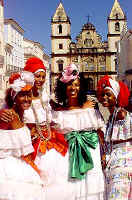Salvador is the capital of Bahia, the heart of Afro-Brazilian culture, home of such Brazilian musical groups as Olodum and Ilê Aiyê and the birthplace of Gilberto Gil and Caetano Veloso, among many other artists. Salvador has the largest street carnival in Brazil. Large sound trucks (“Trio Elétrico”) playing Axé and pagode (two Brazilian styles of music) proceed through the streets, each followed by a huge number of people dancing and partying from mid-afternoon late into the night.
The second biggest festival in Brazil is Sao Joao (Saint John) and takes place in the middle of June. It’s very popular in the North-East and the rhythm of Sao Joao is FORRO. Forro is a catchy, “hick” dance music that is played everywhere during the winter months. Traditionally, it features a drum, accordion and triangle, but also has modern influences, such as the electric guitar. Forro events, such as clubs and concerts always have live forro music. This helps to create the atmosphere, but really it is the attitude of the Brazilian people that makes going to a forro so much fun. Everyone is busy chatting, flirting, dancing and drinking persimmon liquor, the popular drink of Sao Joao.
Capoeira is a martial art that was created by enslaved africans, about 400 years ago. Everything starts with the berimbau (the traditional instrument used in Capoeira). It dictates the speed and type of movements. There are two kinds of Capoeira, Capoeira Regional and Capoeira Angola. Capoeira Angola is the oldest form of Capoeira and as such is a slower, more earthy game. It developes mental balance, and combines self defense, music and a profound sense of art all at once. Capoeira Angola is a social event filled with tradition and history. Capoeira Regional is the newest form of Capoeira, and is faster and more acrobatic.
Salvador has approximately 2.9 million inhabitants. The city has beaches that you can enjoy all year around, spicy food that is still called by its African names (Carurú, Vatapá, Acarajé, etc.). Salvador is the city of the ceremonies of the Candomblé (Yoruban) religion which combines African and Catholic (syncretic) symbolism. In Salvador, you will meet and see people of all ages practicing Capoeira and dancing to Axé music. All this, plus the exotic people known for their love, affection and dance, make Salvador this very special place.
